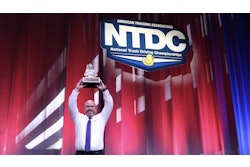Still seemingly on target for its projected Sept. 30 publication, a Final Rule to mandate the use of electronic logging devices has been sent to the White House’s Office of Management and Budget for final approval before being published.
Under the new rule, e-logging devices will be mandatory.The Department of Transportation’s Federal Motor Carrier Safety Administration sent the e-log rule to the OMB today, along with a Final Rule that will implement stiffer penalties for carriers, shippers, brokers and others who coerce or pressure drivers to not abide by federal safety standards like hours-of-service limits.
The OMB legally has 90 days to approve the rules or send them back to FMCSA to be changed, which is unlikely.
The rule, which will take effect two years following its publication in the Federal Register, will require all truck drivers who are required to keep records of duty status to use an electronic logging device, formerly known as electronic onboard recorders.
FMCSA included in the proposed version of the rule several provisions to mitigate the devices potential to be used by carriers to harass drivers.
The agency, however, also took the extra step of producing the Prohibition of Driver Coercion rule, which it also published in a proposed form last year. Though the rule doesn’t apply exclusively to the e-log mandate, it is being advanced in tandem with the ELD rule, at least for now, as a way to ensure this e-log mandate rule does not meet the same fate 2011’s e-log rule did.
The 2011-implemented rule was tossed out in court following complaints by drivers claiming carriers and shippers were using the devices to harass drivers during off-duty periods and to coerce them to operate outside of federal safety rules.
The coercion rule will set in motion a system for drivers to file complaints with FMCSA over claims of coercion or harassment. Per the rule, carriers, shippers and brokers would face up to $11,000 fines for threatening drivers “with loss of work or other economic opportunities for refusing to operate a CMV under circumstances that those entities knew or should have known would require a driver” to violate FMCSA’s hours limits, drug and alcohol testing rules or hazmat regulations, among other rules, according to 2014’s proposed rule.






